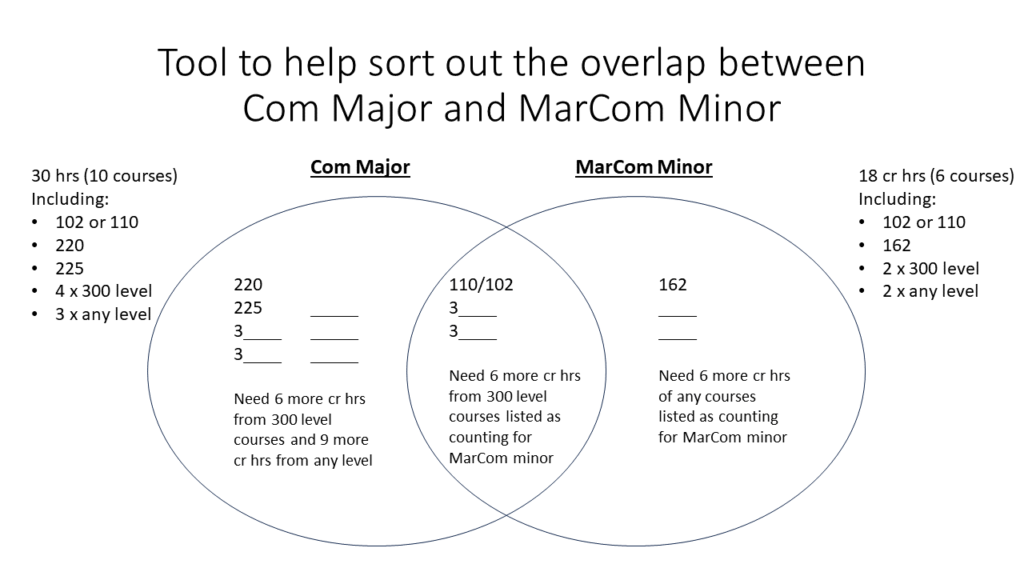Mar Com Minor
Minor in Marketing Communication
A minor in Marketing Communication requires 18 hours, of which up to 9 credit hours may be double counted between the COM Major and the MarCom Minor. All minors are required to take the following:
Either COM 102: Debate and Advocacy or COM 110: Public Speaking
And COM 162: Introduction to Integrated Marketing Communication
In addition, students wishing to minor in Marketing Communication will take an additional 12 hours from the following list of which 6 hours must be at 300 level.
Please note that the bulletin changed in Fall 2025, so for those who had already declared before then the elective options are slightly different than they are for those who declared F25 or later. Scroll down to see specific differences in declaration year.
Elective Options Available to all whether declared before or after F25:
COM 250 Communication for an Entrepreneurial Mindset (3h) Exploration of communication in today’s workplaces and the expectations for leaders and employees to communicate “entrepreneurially.” Focus on communication across settings where teamwork is prioritized. Also listed as ENT 250.
COM 262 Writing for PR and Advertising (3h) Principles and techniques of public relations and applied advertising. Students use case studies to develop public relations and advertising strategies. Also listed as JOU 350. (D) P-COM 162.
COM 264 Digital & Social Media Marketing (3hr) This course outlines the principles and practice of digital and social media marketing in integrated marketing communication. Includes the digital consumer journey, the role of major social media platforms in engaging consumers, and the importance of a data-driven approach to measuring effectiveness. Case studies and real-world examples will be used to illustrate how companies and organizations leverage digital and social media in their marketing communication. (Note: offered prior to F26 under the special topics number COM 270.)
COM 270 Special Topics:
- (Integrated Communication: Digital & Social Media Marketing (3h) is now COM264)
COM 280 Communication Internship (3h/1.5h) (only if MarCom related) Individual communication internships to be approved, supervised, and evaluated by an appropriate faculty adviser. Pass/Fail only. P-POI.
COM 309 Visual Storytelling (3h) The course overviews digital media as well as studying the meaning of how visual images are used in our society. The course is designed to look at the changing landscape of visual storytelling.
COM 315 Communication and Technology (3h) An exploration of how communication technologies influence the social, political, and organizational practices of everyday life.
COM 336 Organizational Rhetoric (3h) Explores the persuasive nature of organizational messages–dealing with risk, reputation, image, legitimacy and strategic communication–including those exchanged between organizational members and those presented in behalf of the organization as a whole.
COM 337 Social Media Marketing in the Creative Arts (3h) Explores how social media is changing not just what content creators produce, but also how creators engage with their audience through the use of social media and marketing techniques.
COM 346 Sports, Media and Communication (3h) Examines the role of sport in society, cultural, and institutional practice. Surveys the value represented by interpersonal and mediated messages regarding key dimensions of sport including competition, ethics, gender, and race.
COM 353 Persuasion (3h) An examination of theories and research concerning the process of social influence in contemporary society.
COM 354 International Communication (3h) An in-depth look at the role of mass media in shaping communication between and about cultures using examples from traditional and emerging media systems.
COM 357 Health Communication and Bioethics (3h) Examination of the principles behind designing, implementing, and evaluation a health campaign, including message design and application of media theories for behavior change.
COM 362 Advanced Campaign Development (3h) Creation of fully integrated communication campaigns for major brands, from uncovering target audience insights to articulating brand strategy and key messaging, through development of the big campaign idea and activation plans for the market. Culminates with team presentation pitches to their “client” and is designed for Communication majors who have demonstrated interest in pursuing careers in marketing communication. P-COM 262 or JOU 350.
COM 363 Communication and Consumer Behavior (3h) Focuses on understanding the psychology of consumer purchasing behavior and how marketing communications can influence that. Examines consumer motivations, influences, decision-making processes, and behaviors as they relate to the development of a marketing communications strategy. P-COM 162.
COM 367 Integrated Marketing Communication for Non-Profit Organizations (3h). Designed for students whose interests involve creating strategic integrated advertising and marketing communications programs for nonprofit organizations. The course explores the many stakeholders served by nonprofits and the variety of objectives nonprofits must achieve to meet the organization’s communication objectives. P-COM 162. (Note: offered prior to F26 under the special topics number COM 370.)
COM 370 Special Topics:
- Social Media and Marketing (3h)
- AI and ChatGPT for Marketing Applications ( 3h).
- Content Marketing and Analytics (3h).
- Consumer Insights for Messaging Strategy Development (3h).
Students may count ONE of the following Journalism courses towards their requirements for the Marketing Communication Minor:
JOU 278 News Literacy (3h) Exploring the difference between news and propaganda, news and opinion, bias and fairness, citizen reporting and professional journalism with a goal of training more discriminating and thoughtful producers and consumers of news. Included: historical context of the news industry.
JOU 330 Podcasting (3h) Introduction to audio storytelling. As the world of podcasting and nonfiction audio grows rapidly, students will learn the building blocks and best practices of audio journalism, including sound editing, and interviewing, and story, and will discuss what journalism means in these changing times. (Please note: while this is a 300 level course in JOU it does not count as one of the COM 300 level courses required for the MarCom minor.)
Additional Elective Options Available to those who declared before F25:
In addition to the two JOU courses listed above, students who declared before F25 may also count JOU270 towards their MarCom minor but may only count one JOU course in total.
JOU 270 Introduction to Journalism (3h) Fundamentals of news reporting, news writing, and news judgment. Digital skills introduced and practiced. Intensive in-class writing.
Additional Elective Options Available to those who declared F25 or later:
Students may count 3 credit hours from the Summer Management Program towards their requirements for the Marketing Communication Minor. This does not replace required courses nor the requirement for two 300 level COM courses. io storytelling. As the world of podcasting and nonfiction audio grows rapidly, students will learn the building blocks and best practices of audio journalism, including sound editing, and interviewing, and story, and will discuss what journalism means in these changing times.
If you are majoring in communication and also minoring in marketing communication, and if you are finding it challenging to figure out what courses count for each and how to count those overall, this graphic should help you sort this out. In it, you can see what counts for the major; what counts for the minor and what can count for both. Keep in mind, though, that counting a class for both the major and minor (e.g., 102) does not mean you can count the credit twice. Overall, you will still need 120 credits to graduate.

MARCOM FACULTY

Polly Black
Associate Teaching Professor and Director of Marketing Communication Minor

